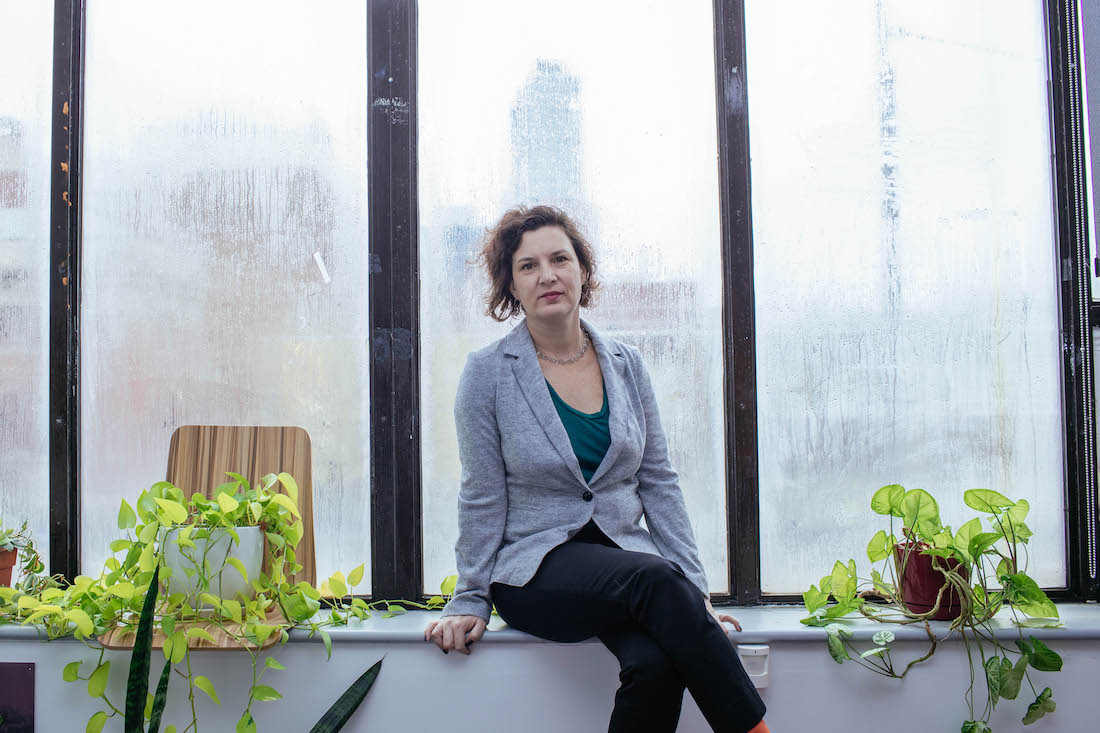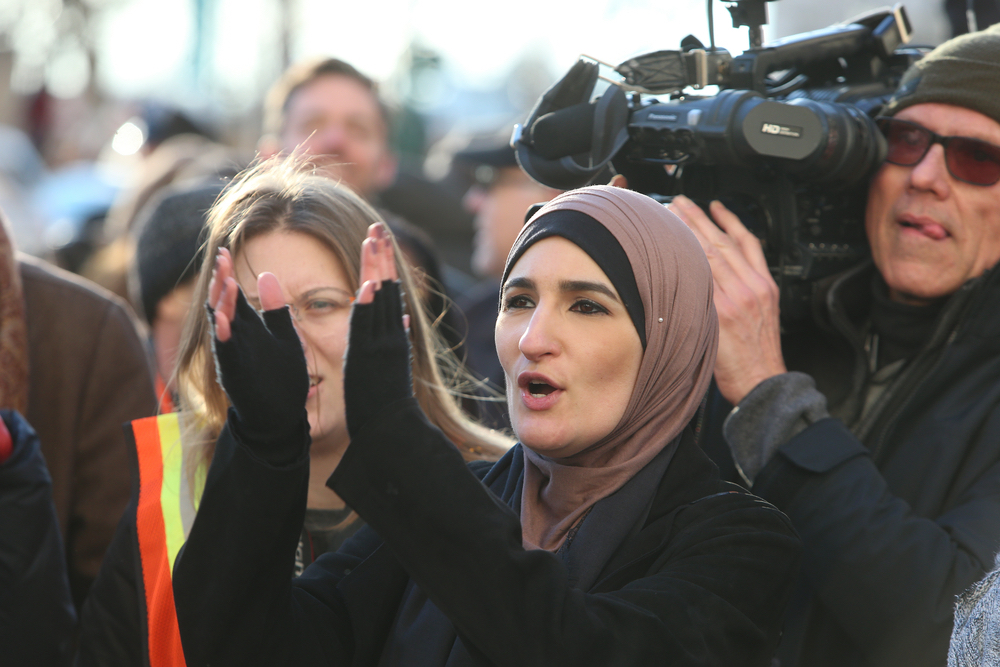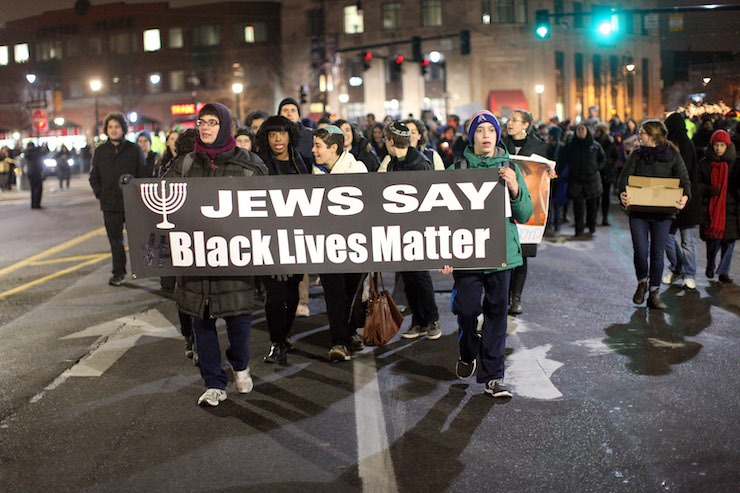‘We often play the role of being able to say things that the rest of the movement cannot,’ Jewish Voice for Peace director Rebecca Vilkomerson says in a wide-ranging interview about the group’s decision to come out as opposed to Zionism, how to fight the conflation of anti-Zionism with anti-Semitism, and recent attacks on Black-Palestine solidarity.
Jewish Voice for Peace’s announcement that it opposes Zionism, published quietly on its website earlier this month, has thus far come and gone without much fanfare or public attention. It simply wasn’t surprising for many.
“This doesn’t change anything about our focus or our political analysis,” JVP’s executive director, Rebecca Vilkomerson says, explaining that the change is not a huge departure for the organization in either practice or principle. “It just names something that hasn’t been named before.”
Naming, however, can have powerful repercussions. Just a few days after the statement went up on JVP’s website, an umbrella group of Jewish organizations in Boston voted to expel any of its members who partner with anti-Zionist Jewish groups.
In many ways, JVP’s decision to declare and formalize its position on Zionism is reflective of the political moment in the United States at large, but also specifically regarding Israel-Palestine. After years in which its supporters took great pains to try and prevent Israel from becoming a divisive, partisan issue, it seems all sides are drawing lines around each other — and just like a growing number of issues, both sides seem to be embracing those divisions, hardening their positions, and demanding litmus tests of varying degrees from their supporters.
The decision to adopt those lines, however, is not always just about standing on a particular side but also creating space for others to fit within them. While much of the demand to make the change came from within the organization, Vilkomerson says in a telephone interview last week, another part had a lot to do with JVP’s Palestinian partners, helping frustrate attempts to label Palestinian activists as anti-Semitic, and making it easier for JVP chapters to enter into explicitly anti-Zionist coalitions.

At least temporarily, the result has been advancing a small shift in the discourse about Zionism. This week, J Street, one of the only other progressive Jewish political outfits on the national scene, came to the defense of JVP and the Workmen’s Circle, the organization that was threatened with banishment from the Boston Jewish community over its ties to JVP.
“We reject the contention that Jewish identity itself or inclusion in the organized Jewish community demands support for Israel or Zionism,” J Street President Jeremy Ben-Ami wrote, while reaffirming that his organization is Zionist and proudly pro-Israel. “We do not accept the contention that all anti-Zionism should be automatically defined as anti-Semitism.”
A change is clearly happening in the way that American Jews talk — and think about — Israel and its ruling ideology. +972 Magazine spoke with Rebecca Vilkomerson about why and what it means that JVP has declared itself to be “unequivocally opposed” to Zionism, but perhaps more interestingly, the broader political moment for the question of Israel-Palestine.
The following has been edited for length and clarity.
Why did JVP publicize this change now? I imagine that it was a long time coming but was there something about this political moment?
“It’s been a very long and intensive process. We actually started talking about doing this in 2016. It turned out to be the perfect political moment to be launching this for a variety of reasons, but we didn’t know that was necessarily going to be true when we started.”
“When we became a national organization in 2005 we made a conscious decision not to describe ourselves as either Zionist or anti-Zionist, or to talk about Zionism at all, because we thought it was a way we could actually state our positions and organize Jewish people.”
“A good portion of our membership had been agitating for some time for us to have a clear stance on Zionism. Many of our Palestinian allies have also been active around talking about Zionism as the root cause of oppression to Palestinians. So especially as chapters were building coalitions, the lack of clarity was confusing and hard for our partners to understand sometimes, and sometimes put barriers in building coalitions.”
“But most relevant to this political moment is that by not having a stance, we were really allowing the opposition to define what Zionism is — and the conversation about it. The increasing push for anti-Zionism to be defined exclusively as anti-Semitism is problematic, and in order to better respond to that we needed to have clarity about our own position.”
How do you address that question beyond your supporters?
“Obviously there are people who are anti-Semitic or anti-Zionist and there are people who mask their anti-Semitism with anti-Zionist language. That’s a given, but that doesn’t paint anti-Zionism as concept.”
“Ever since [the advent of] Zionism there has been anti-Zionism within Jewish communities. One of the things we’re most interested and excited about talking about is Jewishness beyond Zionism, decoupling Zionism from Jewishness, and exploring what Jewishness is like beyond Zionism.”
“The other piece is how important it is for people other than Palestinians [to be] talking about anti-Zionism not being anti-Semitism. When anti-Zionism is defined as anti-Semitism, that means that Palestinians can’t speak of their own oppression without being called anti-Semitic, which is obviously an exceptionally damaging and dangerous thing for someone to say. What it does is silence Palestinian voices from being able to talk about their lived experiences. It’s really important as part of a broader movement to be able to stake out a position that says thoroughly that anti-Zionism is not anti-Semitism.”

I assume that the original decision not to stake a position on Zionism was largely based on — and a lot of other activists have made the same decision — a desire to increase your appeal, to not make it a litmus test for people who want the same moral outcomes but have trouble getting over that particular word or that concept. You said that a lot of the pressure to publish this statement came from within your membership. Has there also been push-back from JVP members?
“So far the feeling is that it’s not so surprising to people that we’re taking this position. This [statement] doesn’t change anything about our campaigns or our focus or our political analysis, it just names something that hasn’t been named before.”
“There’s no doubt that some people will leave JVP because of it. I hope it will be very few people and that a lot of people will stay and struggle with us even if they feel uncomfortable with it right now. I hope we’ve created the conditions for [those people to] still feel heard and respected and seen.”
“For the longest time it felt like the word Zionism ended conversations instead of allowing them. A few years ago we also thought the word apartheid ended conversations, and our opinion shifted on that. There was a shift at some point where it felt like avoiding the word was making it harder to have conversations. I hope it’s clear from this statement that we are not creating some new litmus test. The idea is not that people have to sign on the dotted line in order to be part of [JVP].”
The other side likes to conflate anti-Zionism with anti-Semitism by conflating Zionism with Israel and Israel with the people in Israel, thereby suggesting that being anti-Zionist is to threaten the safety and physical presence of Jewish Israelis. How do you go about separating an ideology and a regime from a people or a state? How do you counter that, particularly beyond the ranks of your membership?
“We need to work to detangle and decouple them. It’s important to understand that was a specific tactic developed by a number of Jewish organizations to specifically define Israel as ‘the Jew of the world,’ essentially, so that critiquing Israel became the equivalent of being anti-Semitic. It’s very effective and very dangerous because it cheapens the definition of what is actual anti-Semitism.”
“The idea that it should shield Israel from criticism because anything said against Israel is inherently anti-Semitic — that concept has been decades in the making. You see it now in the IHRA definition of anti-Semitism and all its variants that are being passed in various ways and places in Europe and the United States.”
“To a large extent that’s the work. Part of challenging that more effectively is also talking about what real anti-Semitism is and how to separate it out.”
One of the things that defines this political moment for me is that it feels like there are lines being drawn around people on this issue. The more that happens, the more people are willing to embrace those divisions and say, ‘you know what, I am on this side or that side.’ What’s the best-case outcome of that? As an organizer, how do you build on that momentum?
“Especially among liberals, and liberal Zionists, there is an increasing pressure to choose. There’s a way that this political moment writ large is forcing people to really grapple with what their values are — and being consistent with them.”
“To a large extent, the audience that we want to reach are liberal Zionists. There are people who still identify as Zionist, who are uncomfortably Zionist, or who are Zionists but with reservations, and those are the people who I think are moving right now. Some of them are saying ‘I can’t let [Zionism] go and therefore I’m going to throw in with the camp on the right.’ And some people are like, ‘okay, it’s the Zionism that I have to let go of and stick to my values.’ As very painful as it is, that’s one of the opportunities of the Trump regime: facing the contradictions.”
“We’re in a battle and we don’t know who’s going to win and it’s very disconcerting and terrifying because of the stakes. I’m talking way beyond Israel-Palestine, more of the general direction of United States, but it’s creating incredible opportunities.”
“What’s definitely happening, and the Michelle Alexander article is a complete distillation of that, is the fight for Palestinian rights is being very much integrated into the progressive left agenda. It’s starting to be seen standard that if you support single-payer healthcare, if you support immigrant rights, and support the fight for $15, then you’re also going to support Palestinian rights.”
What do you make of the recent attacks on Black-Palestine solidarity?
“One thing is that it’s much easier to attack black people than white people — because the country is racist. Black people are much more vulnerable to criticism and critique than white people who have other kinds of privilege, so that’s part of what’s happening.”
“People supporting Israel recognize the danger and the strength of the coalition that’s emerging among people who are supporting Palestinian rights. People understand the power of solidarity and consciousness and moral leadership being brought to bear, especially given the history of civil rights in this country and the parallels.”
“I think the Jewish community in the United States is extremely proud still, and I would say even resting on its laurels a little too much on the ways that Jews were part of the Civil Rights struggle. Jewish identity in the United States, especially a certain kind of liberal progressive Jewish identity, is very tied up in having been good allies to the black community in the United States, and so to be challenged on the basis of a civil rights struggle is very threatening, and potentially very powerful.”

Somebody recently described JVP to me as a Jewish backing block for Palestine organizing in the United States. Is part of the strategy that simply being Jewish and anti-Zionist is a way of educating people that Zionism is not Judaism?
“Absolutely. That’s why it felt really important in the statement to say that we are drawing on this history of anti-Zionism that has always been concurrent with the history of Zionism and that has really been obscured until recently — that has always been a part of Jewish community.”
“The way you just raised the question hit on one of the key things that we grapple with — and when I say grapple, I mean in a healthy way. We often do play the role of being able to say things that the rest of the movement cannot say — to our Jewish communities — and we often take a lot of heat for it, obviously.”
“For a lot of people JVP is part of their Jewishness, and I’ve had many people say that they’ve come back to their Jewishness or come into their Jewishness through JVP. That’s not part of our mission statement but I think it’s a very beautiful byproduct of what we do and that I think people miss sometimes when they think of us just as the Jewish backing block for the Palestine movement. It also brought along a very vibrant Jewish community for those people who wanted it be that.”
It seems like there have been more and more articles either warning about or declaring a schism between Jewish Americans and Jewish Israelis. First off, do you think that’s actually happening? And secondly, is it good for the struggle for justice in Israel-Palestine or for creating an anti-Zionist, non-Israel-dependent Jewish identity in the United States?
“It does seem to be true because Jewish Israelis are increasingly right wing […] and Jewish Americans are still extremely strongly Democratic and extremely strongly connected to traditional progressive, liberal-to-left values, and people’s positions on Palestine have been very strongly shifting”
“It does seem like there’s a real split.”
“What would be good for the movement is if there was a really vibrant resistance movement inside of Israel. It’s great that American Jews are moving on this issue. There is something deeply sad, especially for those of us with really strong ties to Jews inside of Israel, that there is that sense of separation and difference. It may be what has to happen but I think what would be ideal would be is if there were something similar happening [in Israel], which I don’t see really happening.”
Do you think that those people who have who have changed their view on Zionism are coming to an understanding of Zionism was a well-intentioned original sin — looking for a solution for a genuine real problem but with the wrong answer? Do they feel they were lied to about what Zionism meant? Or is it that people feel like it’s been hijacked by the wrong Zionism and therefore they can’t support any Zionism anymore?
“It’s different for different people, obviously.”
“We wanted to acknowledge that other forms of Zionism have existed but that was what was most important was to talk about the Zionism that won. That you can’t excuse Zionism any more by saying ‘but there are all these different steams of Zionism that existed at the time and you could have lots of conversations.'”
“There are different camps among JVP members about whether it matters that there were kinds of Zionism that in an alternate universe could have gone in a different direction or whether it was just doomed from the start because it’s an inherently flawed ideology that places Jews above others in practice. The important thing that we all agree on is what it looks like now.”

